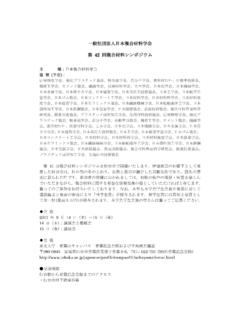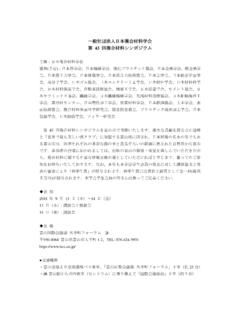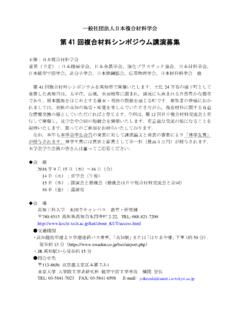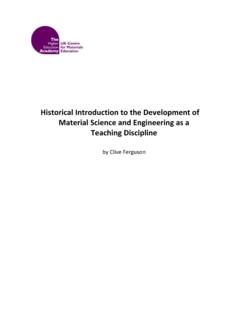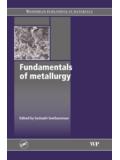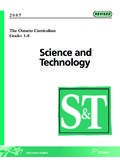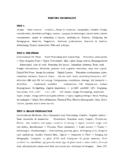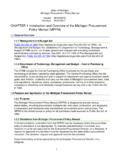Transcription of 3D Printer Using Continuous Carbon Fiber …
1 3D Printer Using Continuous Carbon Fiber composite Materials Department of Mechanical Engineering Tokyo University of Science Ryosuke Matsuzaki 1. Background 3D Printer for resin material times in 4 years Predicted to bring a Revolution in Manufacturing that will dramatically change manufacturing World 3D Printer market to grow to Transition of scale of world 3D. 320,000 units in 2017 Printer market (Yano Research Institute Ltd., 2014). Resin is not suitable for fabrication of structural members Primarily used for fabrication of prototypes and toys Engine block prototype (METI Journal, 2013) 2. Background Carbon ber reinforced plastic (CFRP) 50% composite materials Lighter, more rigid, and stronger than existing metallic materials Increasing application, widespread in airplanes and automobiles Molding of current composite materials is a very complicated process CFRP usage ratio in latest passenger plane (Boeing).
2 Laminating Heating Demolding Single product Sub- Assembly of and machining assembly all parts hardening 2D/3D. designing Materials Assembly Cost 100. Parts 3. Conventional Technology and Its Issues CFRP molding 3D Printer Merits: High strength and rigidity Merit: Automatic 3D molding Demerits: Die is required, costly Demerits: Low strength and rigidity Solution is a 3D Printer that manufactures Continuous Carbon ber composite materials High strength 4. Continuous Carbon ber High Strength 3D Molding by Using Continuous Carbon Fiber 3D Printer The Printer nozzle integrates Continuous Carbon ber with thermoplastic resin Thermoplastic lament Continuous Carbon ber Drive gear Printer head Preheater Heater Nozzle Continuous Carbon ber Hot table composite materials 5. Characteristics of New Technology and Comparison with Conventional Technology l Uses Continuous Carbon ber, and prints highly rigid and strong materials three dimensionally l Does not require a die and optimization is automatic, molding and machining (trimming) based on 3D CAD data Suitable for multi-product production in small lots Signi cantly reduces development period, manufacturing time, cost, and weight l Low cost as the widespread 3D Printer technology can be applied Cost of a similar technology, automated ber placement, is over 100,000 USD.
3 Implementation Automated Fiber Placement of this technology is very rare in Japan. (Netherlands Aerospace Centre). l Because orientation and content of ber are controllable, the advantage of CFRP is fully harnessed in combination with the optimization method 6. CFRTP 3D Printing 3D printing of composite materials (movie). 7. Fiber Cutting Mechanism Fiber is cut during printing, to realize free three-dimensional shaping Carbon ber cutting (movie). 8. 3D-Printed Test Piece in Dumbbell Shape PLA test piece (without reinforcing ber). CFRP for 3D printing 200 mm t : 4 mm JFRP for 3D printing Green composite combining jute ber and PLA. 9. 9. material Characteristics of 3D Printing composite Materials Introducing Continuous Carbon ber increases the modulus and strength by 4 to 6 times 25". strength (MPa). 250". modulus (GPa). 20". Increases Increases by Tensile"modulus"(GPa). 200". Tensile"strength"(MPa). by 6 times times 15" 150".
4 10" 100". Tensile Tensile 5" 50". 0" 0". PLA" JFRTP" CFRTP" PLA" JFRTP" CFRTP". PLA JFRP CFRP PLA JFRP CFRP. 10. material Characteristics Comparison with Commercially Available Industrial 3D Printers The characteristics are dramatically improved compared to commercially available industrial 3D printers 30. 25. (GPa). modulus (GPa). 20 Reinforced Tensile modulus FDM. 15. Continuous Carbon ber method Young's 10 Continous Fiber Selective laser Sintering SLS composites SLA. 5 Stereolithography FDM. Fused deposition modeling 0. 0 50 100 150 200 250. Strength Tensile (MPa)(MPa). strength 11. Device Image l Desktop composite material 3D Printer Optimizes ber orientation from 3D CAD data 3D printing of high strength Carbon ber composite materials on desktop Can also machine and trim by changing the head l Structure Highly rigid base Compatible with heavy head for molding composite materials Compatible with 3D CNC Spindle installed (3D CNC).
5 Multiple head types Spindle CNC machining Prepreg tape layup In-situ impregnated CFRTP. Software Optimization of ber orientation 12. Prepreg tape layup head New Design Concept Leads to New Products Not bound by conventional linear ber orientation, and degree of design freedom is signi cantly improved, including curvature ber orientation New design concept allows creation of new products Same D CAD data yields di erent products, indicating that the performance of the optimizer determines product performance. Accumulated knowledge on optimization including curvature orientation. Continuous ber orientation Stress distribution Fiber content considered 13. Additional Capacity for Automatic Manufacturing of New Structure Automatic isogrid molding Reduction of stress concentration Bending Prevention of delamination Sandwich structure Modulus/strength/ tailoring 14. Software-controlled Manufacturing Key to optimizing ber orientation and strength database.
6 Manufacturing will be software-controlled, and information will be centralized in Japan; thus, replicating the technology will be di cult. Manufacturing Plant Digital design information Design conditions Faster development Flexible production Information center 15. Potential Applications Application l Suitable for manufacturing a variety of components requiring structural strength in small lots, and substantially reduces development period, manufacturing time, cost and weight l Aviation, automobile, medical, and general work equipment sectors. Particularly, machining jigs and medical care devices such as prosthetic legs and assist suits l Possibility of application to batch manufacturing by combining 3D Printer and an assembly robot for metal parts Other developments l High-level amateurs l Post secondary and corporate research institutions Education: prototyping, designing, and optimizing Research: Adaptable to diverse requirements 16.
7 Challenges for Practical Applications Technology required for ber orientation optimization, Continuous Carbon ber 3D printing, and ber cutting has already been developed. The ber volume fraction needs to be increased to the level of existing CFRP products. Future scope of this study is to develop nozzles and laments to achieve a high volume fraction of ber. It is also necessary to establish a technology to improve the accuracy of three-dimensional molding to the level of existing 3D printers for practical applications. 17. Expectation to Businesses Introduction of this technology is expected to be e ective for businesses that require (manufacturing of) various strength components in small lots. Joint study with companies having the technology to manufacture this Printer as a complete device Joint study with companies considering developing a new business in the 3D Printer area Assistance in establishing a venture business 18.
8 Intellectual Property Right of This Technology PCT Application Title of invention: Three-dimensional Printing System, Three-dimensional Printing Method, Molding Device, Fiber -containing Object, and Production Method Application No.: PCT/JP2015/ 65300. Filing date: May 27, 2015. 19. History of Industry-Academia Collaboration 2014: Selected for Support Industry Program under Strategic Core Technology Advancement Program (Supporting Industry Program). 2015: Selected for NEDO Next Generation Structural Member Manufacturing and Machining Technology Development 20. Contact Reiko Moriya, URA University Research Administration Center Tokyo University of Science TEL +81-3-5228-7440. FAX +81-3-5228-7441. E-mail 21.
